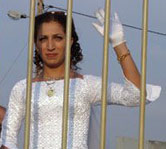 “The Syrian Bride” is an Israeli movie that points to some of the absurdities and everyday tragedies of a long-term conflict like that between Israel and its neighbors. The movie focuses on a Druze family living in the Golan Heights, which Israel captured from Syrian in the 1967 Six Day War.
“The Syrian Bride” is an Israeli movie that points to some of the absurdities and everyday tragedies of a long-term conflict like that between Israel and its neighbors. The movie focuses on a Druze family living in the Golan Heights, which Israel captured from Syrian in the 1967 Six Day War.
One of the daughters in the family is engaged to a soap opera star from Damascus (whom she’s never met in person), and the film takes place on her wedding day, when she will cross the border into Syria and never be allowed to return because of the hostilities between Israel and Syria. She is leaving her family behind for a man she doesn’t really know.
Along the way, we meet the bride’s family and members of her village, who together paint a diverse and multi-layered portrait of life in the village: Her father spent time in an Israeli prison for opposing Israeli rule over the Golan Heights and returned a sad shell of the vibrant man he was before. He might not be able to see his daughter off at the border because of the conditions of his parole. One of her brothers is a wheeler-dealer international businessman always ready to charm the ladies and make a quick buck. Another married a Russian woman and lives in Russia; he is shunned by (most of) his family, and this is his first visit back.
The village’s religious leaders threaten the father with excommunication if he accepts his son back. Meanwhile, the bride’s sister is unhappily married to a villager and hopes to go to school to be a social worker, which her macho husband opposes. And this sister’s daughter is in love with the son of a man who was murdered for supposedly being an Israeli collaborator.
I was struck by two things in watching this film. The first is the complexity of the community depicted, a depth captured all too seldom in movies. The Druze village is neither fully secular nor fully religious, and belies any attempt to make the two stark choices. A wife and mother stays in a troubled marriage for myriad reasons, spoken and unspoken. A father struggles to reconcile love for his son and obedience to the village elders and decision-makers. And a young woman says good-bye forever to the family she loves for a great unknown.
Secondly, the film’s depiction of the constant presence of the Israeli-Arab conflict in the lives of these characters was striking, from the police presence at a rally in the village to the megaphones that family members use to communicate with each other across the border. In the end, the wedding party arrives at the border only to be caught up in a bureaucratic shoving match between the Syrians and the Israelis over a stamp in her passport. It’s satire at its best: absurd, hilarious, and devastating.


